2006 年 6 月大学英语四级真题及答案
2.
3.
4.
5.
(20 minutes)
Listening Comprehension
Part I
Section A
Directions: In this section, you will hear 10 short conversations. At the end of
each conversation, a question will be asked about what was said. Both the
conversationandthequestionwill bespokenonlyonce.Aftereachquestionthere
will be a pause. During the pause, you must read the four choices marked A), B),
C)andD),anddecidewhichisthebestanswer.Thenmarkthecorrespondingletter
on the Answer Sheet with a single line through the centre.
A) They enjoyed the party better than the other guests.
1.
B) They knew none of the other guests at the party.
C) They didn’t think much of the food and drinks.
D) They went a long way to attend the party.
A) To the dentist’s.
B) To the market.
C) To the post office.
D) To the bookstore.
A) She dislikes Dr. Andrews as much as the new physician.
B) Dr. Andrews has been promoted for his thoroughness.
C) She disagrees with Dr. Andrews on many occasions.
D) Dr. Andrews used to keep his patients waiting.
A) Tom is usually talkative.
B) Tom has a very bad temper.
C) Tom is disliked by his colleagues.
D) Tom has dozens of things to attend to.
A) To find out more about the topic for the seminar.
B) To make a copy of the schedule for his friend.
C) To get the seminar schedule for the woman.
D) To pick up the woman from the library.
A) The man doesn’t want to sell his textbooks to the woman.
B) The woman has to get the textbooks in other ways.
C) The woman has sold her used textbooks to the bookstore.
D) The man is going to buy his textbooks from a bookstore.
A) Give a speech.
B) Meet his lawyer.
C) Attend a conference.
D) Make a business trip.
A) Jessie should know the marketing director better.
B) Jessie is wrong to find fault with her boss.
C) Jessie seems to have a lot on her mind.
D) Jessie always says what she thinks.
A) Helen is quiet.
6.
7.
8.
9.
�
B) Helen is talkative.
C) Helen is sociable.
D) Helen is active.
10.
A) Jimmy is not serious in making decisions.
B) Jimmy is rich enough to buy a big house.
C) Jimmy’s words are often not reliable.
D) Jimmy will regret marrying a Frenchwoman.
Section B
Directions: In this section, you will hear 3 short passages. At the end of each
passage,you willhearsome questions. Boththe passageand the questions willbe
spoken only once. After you hear a question, you must choose the best answer from
the four choices marked A), B), C) and D). Then mark the corresponding letter on
the Answer Sheet with a single line through the centre.
Passage One
Questions 11 to 13 are based on the passage you have just heard.
11.
A) It has done more harm than good in the southern USA.
B) It was brought to the northern USA by Asian farmers.
C) It was introduced into the USA to kill harmful weeds.
D) It can be used by farmers to protect large buildings.
12.
A) They will become too hard to plough.
B) They will soon be overgrown with kudzu.
C) People will have to rely on kudzu for a living.
D) People will find it hard to protect the soil.
13.
A) The soil there is not so suitable for the plant.
B) The factories there have found a good use for it.
C) The farmers there have brought it under control.
D) The climate there is unfavorable to its growth.
Passage Two
Questions 14 to 16 are based on the passage you have just heard.
14.
A) The universe as a whole
B) A society of legal professionals.
C) An association of teachers and scholars.
D) A business corporation.
15.
A) Provincial colleges were taken over by larger universities.
B) Its largest expansion took place during that period.
C) Small universities combined to form bigger ones.
D) Its role in society went through a dramatic change.
16.
A) Private donations.
B) Fees paid by students.
C) Government funding.
D) Grants from corporations.
Passage Three
Questions 17 to 20 are based on the passage you have just heard.
17.
A) He was interested in the study of wild animals.
�
B) He started the organization Heifer International.
C) He was wounded in the Spanish civil war.
D) He sold his cows to many countries in the world.
18.
A) To make plans for the development of poor communities.
B) To teach people how to use new skills to raise animals.
C) To help starving families to become self-supporting.
D) To distribute food to the poor around the world.
19.
A) They should submit a report of their needs and goals.
B) They should provide food for the local communities.
C) They should offer all baby animals to their poor neighbors.
D) They should help other families the way they have been helped.
A) It has helped relieve hunger in some developing countries.
20.
B) It has improved animal breeding skills all over the world.
C) It has bridged the gap between the rich and the poor in America.
D) It has promoted international exchange of farming technology.
(35 minutes)
Reading Comprehension
Part II
Directions: There are 4 passages in this part. Each passage is followed by some
questionsorunfinishedstatements.Foreachofthemtherearefourchoicesmarked
A),B),C)andD).Youshoulddecideonthebestchoiceandmarkthecorresponding
letter on the Answer Sheet with a single line through the centre.
Passage One
Questions 21 to 25 are based on the following passage.
Educating girls quite possibly yields a higher rate of return than any other
investment available in the developing world. Women’s education may be unusual
territory for economists, but enhancing women’s contribution to development is
actually as much an economic as a social issue. And economics, with its emphasis
on incentives (激励), provides guideposts that point to an explanation for why so
many girls are deprived of an education.
Parents in low-income countries fail to invest in their daughters because they
do not expect them to make an economic contribution to the family: girls grow up
only to marry into somebody else’s family and bear children. Girls are thus seen
as less valuable than boys and are kept at home to do housework while their brothers
are sent to school-the prophecy (预言) becomes self-fulfilling, trapping women in
a vicious circle (恶性循环) of neglect.
An educated mother, on the other hand, has greater earning abilities outside
the home and faces an entirely different set of choices. She is likely to have fewer
but healthier children and can insist on the development of all her children,
ensuring that her daughters are given a fair chance. The education of her daughters
then makes it much more likely that the next generation of girls, as well as of boys,
will be educated and healthy. The vicious circle is thus transformed into a virtuous
circle.
Few will dispute that educating women has great social benefits. But it has
enormous economic advantages as well. Most obviously, there is the direct effect
of education on the wages of female workers. Wages rise by 10 to 20 per cent for
�
each additional year of schooling. Such big returns are impressive by the standard
of other available investments, but they are just the beginning. Educating women
also has a significant impact on health practices, including family planning.
21. The author argues that educating girls in developing countries is _________.
D) labor-saving
22. By saying “…the prophecy becomes self-fulfilling…” (Lines 4-5, Para. 2),
B) troublesome
A) rewarding
C) expensive
the author means that __________.
A) girls will eventually find their goals in life beyond reach
B) girls will be increasingly discontented with their life at home
C) girls will be capable of realizing their own dreams
D) girls will turn out to be less valuable than boys
23. The author believes that a vicious circle can turn into a virtuous circle when
________
A) women care more about education
B) parents can afford their daughters’ education
C) girls can gain equal access to education
D) a family has fewer but healthier children
24. What does the author say about women’s education?
A) It has aroused the interest of a growing number of economists.
B) It will yield greater returns than other known investments.
C) It is now given top priority in many developing countries.
D) It deserves greater attention than other social issues.
25. The passage mainly discusses __________.
A) unequal treatment of boys and girls in developing countries
B) the major contributions of educated women to society
C) the economic and social benefits of educating women
D) the potential earning power of well-educated women
Passage Two
Questions 26 to 30 are based on the following passage.
Psychiatrists (精神病专家) who work with older parents say that maturity can
be an asset in child rearing ---- older parents are more thoughtful, use less physical
discipline and spend more time with their children. But raising kids takes money
and energy. Many older parents find themselves balancing their limited financial
resources, declining energy and failing health against the growing demands of an
active child. Dying and leaving young children is probably the older parents’
biggest, and often unspoken, fear. Having late-life children, says an economics
professor, often means parents, particularly fathers, “end up retiring much
later.” For many, retirement becomes an unobtainable dream.
Henry Metcalf, a 54-year-old journalist, knows it takes money to raise kids.
But he’s also worried that his energy will give out first. Sure, he can still ride
bikes with his athletic fifth grader, but he’s learned that young at heart doesn’t
mean young. Lately he’s been taking afternoon naps (午睡) to keep up his energy.
“My body is aging,” says Metcalf, “You can’t get away from that.”
Often, older parents hear the ticking of another kind of biological clock.
�
Therapists who work with middle-aged and older parents say fears about aging are
nothing to laugh at. “They worry they’ll be mistaken for grandparents, or that
they’ll need help getting up out of those little chairs in nursery school,” says
Joann Galst, a New York psychologist. But at the core of those little fears there
is often a much bigger one: “that they won’t be alive long enough to support and
protect their child,” she says.
Many late-life parents, though, say their children came at just the right time.
After marrying late and undergoing years of fertility (受孕) treatment, Marilyn
Nolen and her husband, Randy, had twins. “We both wanted children,” says Marilyn,
who was 55 when she gave birth. The twins have given the couple what they desired
for years, “a sense of family.”
Kids of older dads are often smarter, happier and more sociable because their
fathers are more involved in their lives. “The dads are older, more mature,” says
Dr. Silber, “and more ready to focus on parenting.”
26. Why do psychiatrists regard maturity as an asset in child rearing?
A) Older parents can better balance their resources against children’s demands.
B) Older parents are usually more experienced in bringing up their children.
C) Older parents are often better prepared financially.
D) Older parents can take better care of their children.
27. What does the author mean by saying “For many, retirement becomes an
unobtainable dream” (Lines 7-8, Para. 1)?
A) They have to go on working beyond their retirement age.
B) They can’t get full pension unless they work some extra years.
C) They can’t obtain the retirement benefits they have dreamed of.
D) They are reluctant to retire when they reach their retirement age.
28. The author gives the example of Henry Metcalf to show that _________.
A) many people are young in spirit despite their advanced age
B) taking afternoon naps is a good way to maintain energy
C) older parents tend to be concerned about their aging bodies
D) older parents should exercise more to keep up with their athletic children.
29. What’s the biggest fear of older parents according to New York psychologist
Joann Galst?
A) Being laughed at by other people.
B) Slowing down of their pace of life.
C) Being mistaken for grandparents.
D) Approaching of death.
30. What do we learn about Marilyn and Randy Nolen?
A) They thought they were an example of successful fertility treatment.
B) Not until they had the twins did they feel they had formed a family.
C) They believed that children born of older parents would be smarter.
D) Not until they reached middle age did they think of having children.
Passage Three
Questions 31 to 35 are based on the following passage.
Interest in pursuing international careers has soared in recent years, enhanced
�
by chronic (长久的) personnel shortages that are causing companies to search beyond
their home borders for talent.
Professionals seek career experience outside of their home countries for a
variety of reasons. They may feel the need to recharge their batteries with a new
challenge. They may want a position with more responsibility that encourages
creativity and initiative. Or they may wish to expose their children to another
culture, and the opportunity to learn a second language.
When applying for a job, one usually has to submit a resume or curriculum vitae
(CV). The two terms generally mean the same thing: a one-or two-page document
describing one’s educational qualifications and professional experience. However,
guidelines for preparing a resume are constantly changing. The best advice is to
find out what is appropriate regarding the corporate (公司的) culture, the country
culture, and the culture of the person making the hiring decision. The challenge
will be to embrace two or more cultures in one document. The following list is a
good place to start.
Pay
attention
Educational requirements differ from country to country. In almost every
case of “cross-border” job hunting, just stating the title of your degree
will not be an adequate description. Provide the reader with details about
your studies and any related experience.
format
or
reverse-chronological order. Chronological order means listing your
“oldest” work experience first. Reverse-chronological order means
listing your current or most recent experience first. Most countries have
preferences about which format is most acceptable. If you find no specific
guidelines, the general preference is for the reverse-chronological
format.
use---chronological
to
the
resume
you
If you are submitting your resume in English, find out if the recipient
( 收 件 人 ) uses British English or American English because there are
variations between the two versions. For example, university education is
often referred to as “tertiary education” in the United Kingdom, but this
term is almost never used in the United States. A reader who is unfamiliar
with these variations may assume that your resume contains errors.
31. Companies are hiring more foreign employees because___________.
A) they have difficulty finding qualified personnel at home.
B) they find foreign employees are usually more talented
C) the need original ideas from employees hired overseas
D) they want to expand their business beyond home borders
32. The author believes that an individual who applies to work overseas ___________.
A) is usually creative and full of initiative
B) aims to improve his foreign language skills
C) seeks either his own or his children’s development
D) is dissatisfied with his own life at home
33. When it comes to resume writing, it is best to __________
A) know the employer’s personal likes and dislikes
�
B) follow appropriate guidelines for job hunting
C) learn about the company’s hiring process
D) take cultural factors into consideration
34. When writing about qualifications, applicants are advised to ________.
A) provide a detailed description of their study and work experiences
B) give the title of the university degree they have earned at home
C) highlight their keen interest in pursuing a “cross-border” career
D) stress their academic potential to impress the decision maker
According to the author’s last piece of advice, the applicants should be
35.
aware of ________
A) the recipient’s preference with regard to the format
B) the different educational systems in the US and the UK
C) the differences between the varieties of English
D) the distinctive features of American and British cultures
Passage Four
Questions 36 to 40 are based on the following passage.
Speeding off in a stolen car, the thief thinks he has got a great catch. But
he is in for an unwelcome surprise. The car is fitted with a remote immobiliser(锁
止器), and a radio signal from a control centre miles away will ensure that once
the thief switches the engine off, he will not be able to start it again.
The idea goes like this. A control box fitted to the car contains a
mini-cellphone, a microprocessor and memory, and a GPS (全球定位系统) satellite
positioning receiver. If the car is stolen, a coded cellphone signal will tell the
control centre to block the vehicle’s engine management system and prevent the
engine being restarted.
In the UK a set of technical fixes is already making life harder for car thieves.
“The pattern of vehicle crime has changed,” says Martyn Randall, a security expert.
He says it would only take him a few minutes to teach a person how to steal a car,
using a bare minimum of tools. But only if the car is more than 10 years old.
Modern cars are far tougher to steal, as their engine management computer won’t
allow them to start unless they receive a unique ID code beamed out by the ignition
(点火) key. In the UK, technologies like this have helped achieve a 31% drop in
vehicle-related crime since 1997.
But determined criminals are still managing to find other ways to steal cars,
often by getting hold of the owner’s keys. And key theft is responsible for 40%
of the thefts of vehicles fitted with a tracking system.
If the car travels 100 metres without the driver confirming their ID, the system
will send a signal to an operations centre that it has been stolen. The hundred metres
minimum avoids false alarms due to inaccuracies in the GPS signal.
Staff at the centre will then contact the owner to confirm that the car really
is missing, and keep police informed of the vehicle’s movements via the car’s GPS
unit.
36. What’s the function of the remote immobiliser fitted to a car?
A) To allow the car to lock automatically when stolen.
�
B) To prevent the car thief from restarting it once it stops.
C) To help the police make a surprise attack on the car thief.
D) To prevent car theft by sending a radio signal to the car owner.
37. By saying “The pattern of vehicle crime has changed” (Lines 1-2, Para.3),
Martyn Randall suggests that _________.
A) self-prepared tools are no longer enough for car theft
B) the thief has to make use of computer technology
C) it takes a longer time for the car thief to do the stealing
D) the thief has lost interest in stealing cars over 10 years old
38. What is essential in making a modern car tougher to steal?
A) A GPS satellite positioning receiver
B) A unique ID card
C) A special cellphone signal
D) A coded ignition key
39. Why does the tracking system set a 100-metre minimum before sending an alarm
to the operations centre?
A) To give the driver time to contact the operations centre
B) To allow for possible errors in the GPS system
C) To keep police informed of the car’s movements
D) To leave time for the operations centre to give an alarm
40. What will the operations centre do first after receiving an alarm?
A) Start the tracking system.
B) Locate the missing car.
C) Contact the car owner.
D) Block the car engine.
Vocabulary
Part III
Directions:Thereare30incompletesentencesinthispart.Foreachsentencethere
arefourchoicesmarkedA),B),C)andD).ChoosetheONEanswerthatbestcompletes
thesentence.ThenmarkthecorrespondingletterontheAnswerSheetwithasingle
line through the centre.
41. A special feature of education at MIT is the opportunity for students and faculty
(20 minutes)
to _________ together in research activities.
A) involve
B) participate
C) specialize
D)
consist
42. American college students are increasingly __________ with credit card debt and
the consequences can be rather serious.
A) discharged
C) boosted
D) burdened
43. Some people argue that the death ___________ does not necessarily reduce the
B) dominated
number of murders.
A) penalty
B) plot
C) pattern
D) practice
44. A study shows that students living in non-smoking dorms are less likely to
__________ the habit of smoking.
A) turn up
B) pick up
C) make up
D) draw up
45. The most successful post-career athletes are those who can take the identity
�
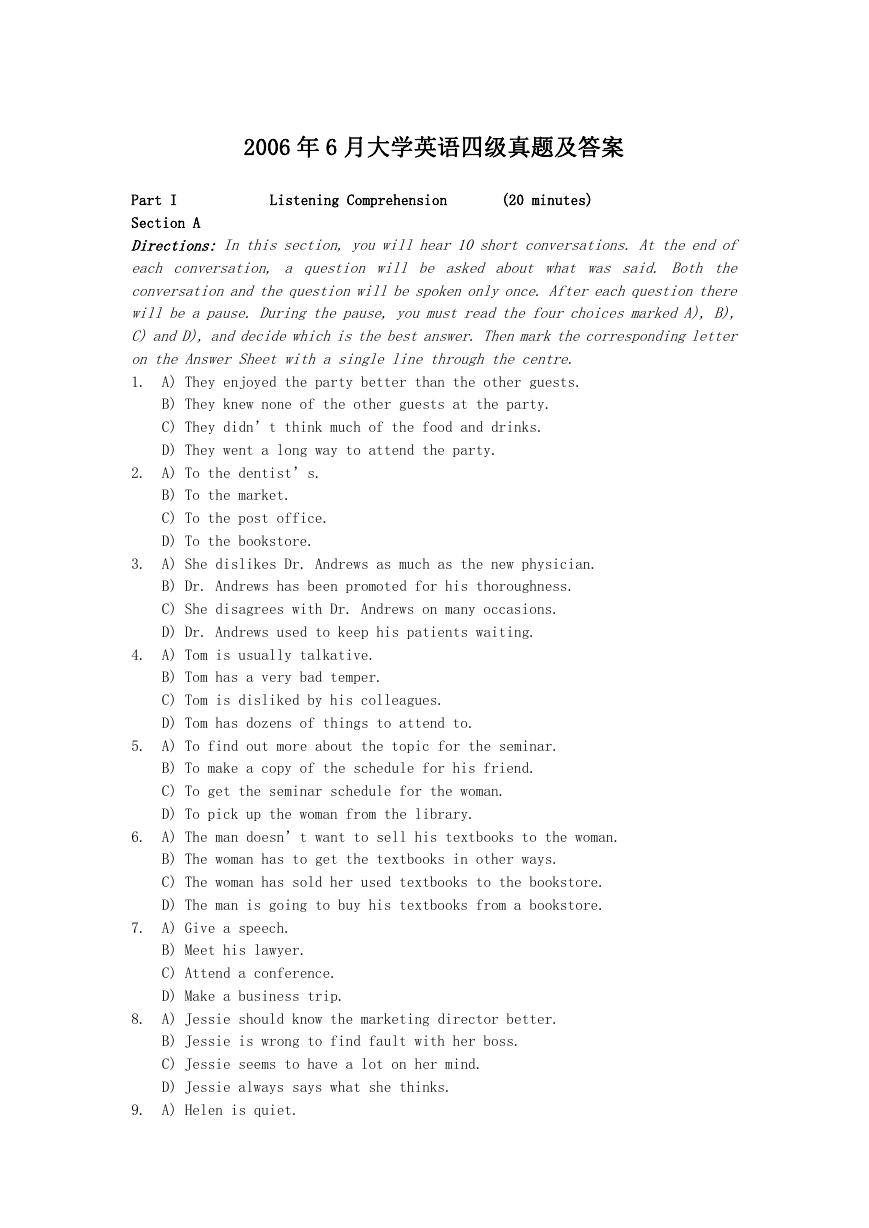

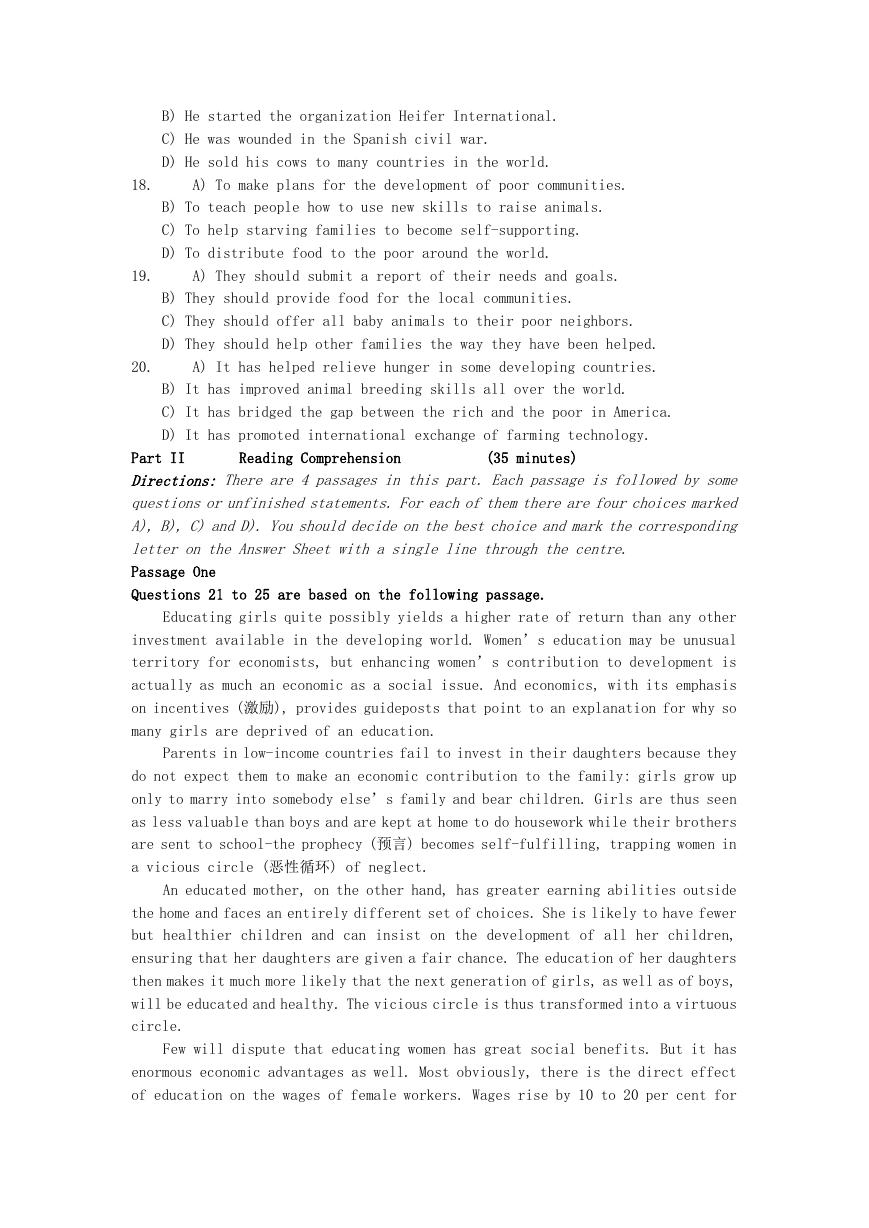


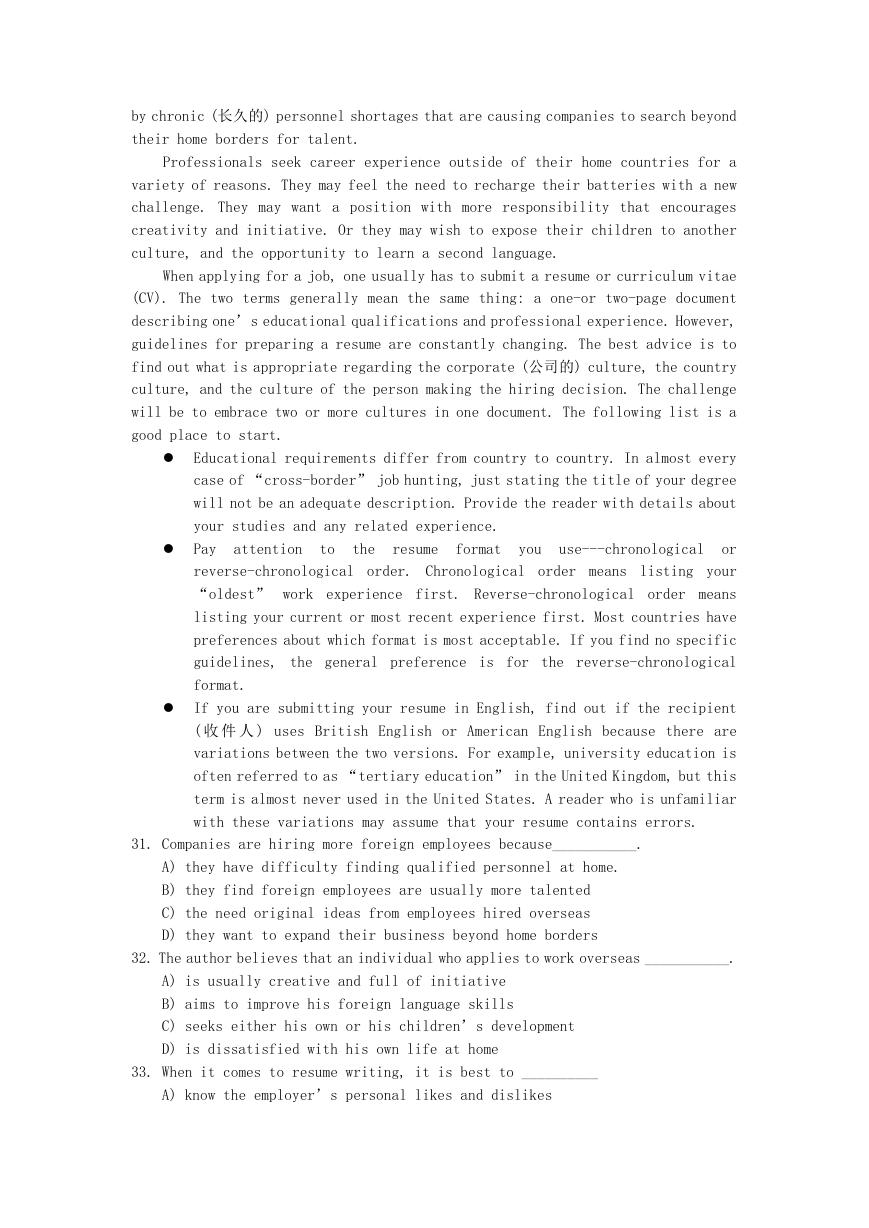
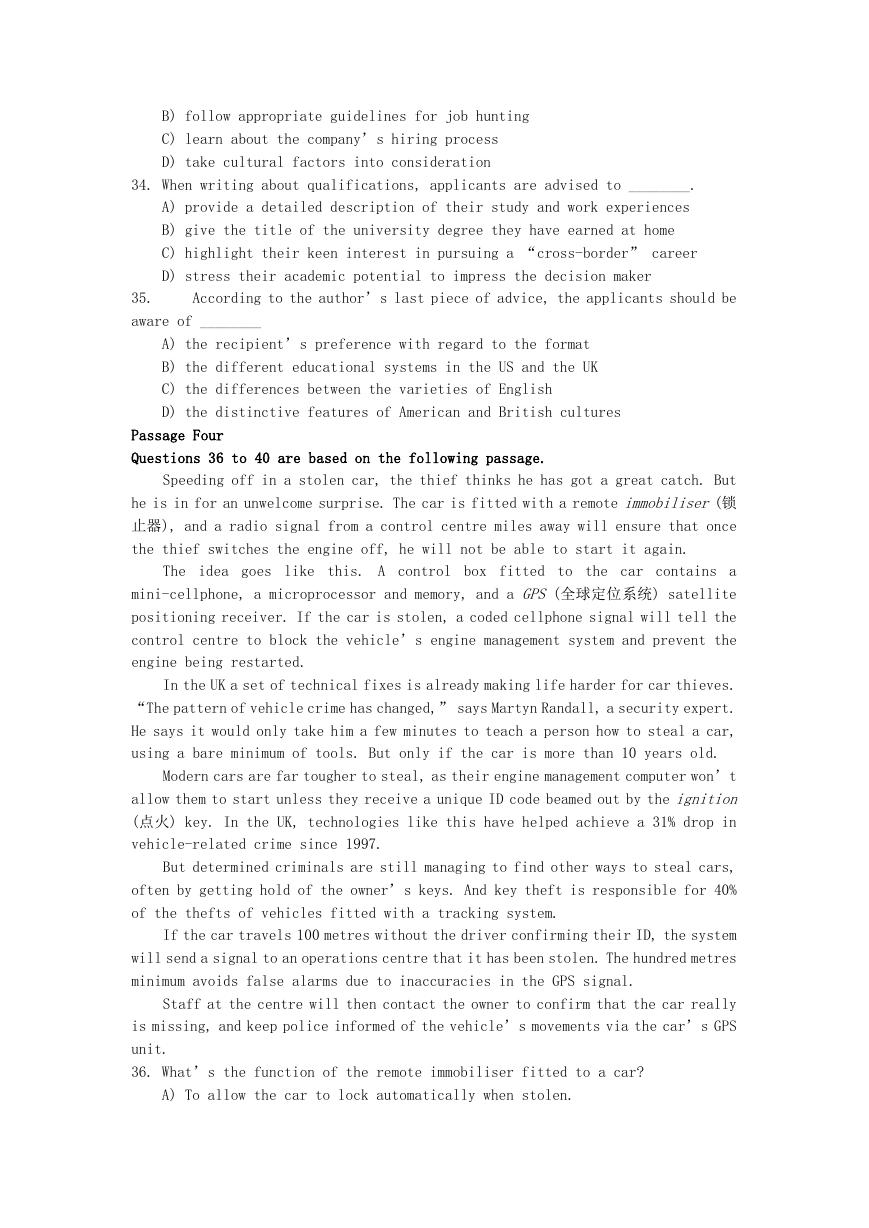
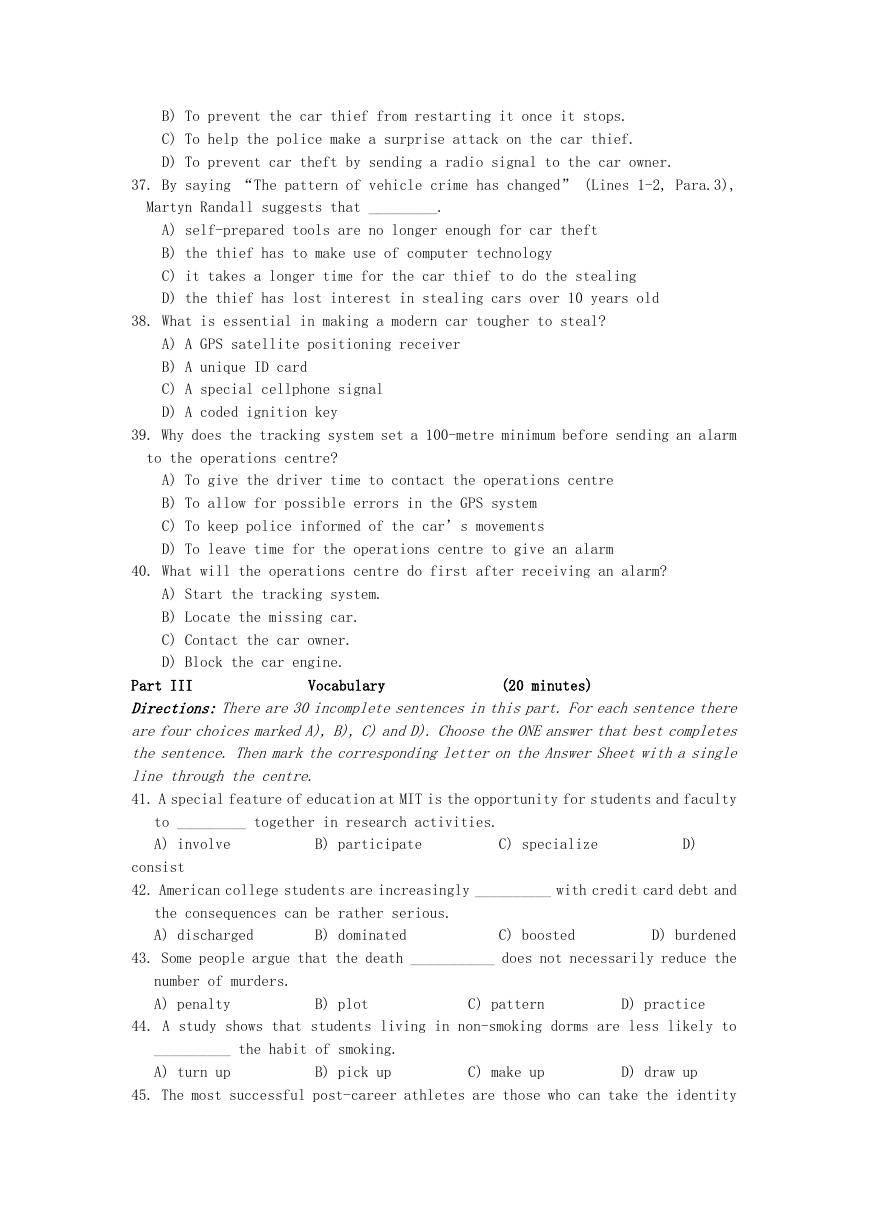








 2023年江西萍乡中考道德与法治真题及答案.doc
2023年江西萍乡中考道德与法治真题及答案.doc 2012年重庆南川中考生物真题及答案.doc
2012年重庆南川中考生物真题及答案.doc 2013年江西师范大学地理学综合及文艺理论基础考研真题.doc
2013年江西师范大学地理学综合及文艺理论基础考研真题.doc 2020年四川甘孜小升初语文真题及答案I卷.doc
2020年四川甘孜小升初语文真题及答案I卷.doc 2020年注册岩土工程师专业基础考试真题及答案.doc
2020年注册岩土工程师专业基础考试真题及答案.doc 2023-2024学年福建省厦门市九年级上学期数学月考试题及答案.doc
2023-2024学年福建省厦门市九年级上学期数学月考试题及答案.doc 2021-2022学年辽宁省沈阳市大东区九年级上学期语文期末试题及答案.doc
2021-2022学年辽宁省沈阳市大东区九年级上学期语文期末试题及答案.doc 2022-2023学年北京东城区初三第一学期物理期末试卷及答案.doc
2022-2023学年北京东城区初三第一学期物理期末试卷及答案.doc 2018上半年江西教师资格初中地理学科知识与教学能力真题及答案.doc
2018上半年江西教师资格初中地理学科知识与教学能力真题及答案.doc 2012年河北国家公务员申论考试真题及答案-省级.doc
2012年河北国家公务员申论考试真题及答案-省级.doc 2020-2021学年江苏省扬州市江都区邵樊片九年级上学期数学第一次质量检测试题及答案.doc
2020-2021学年江苏省扬州市江都区邵樊片九年级上学期数学第一次质量检测试题及答案.doc 2022下半年黑龙江教师资格证中学综合素质真题及答案.doc
2022下半年黑龙江教师资格证中学综合素质真题及答案.doc